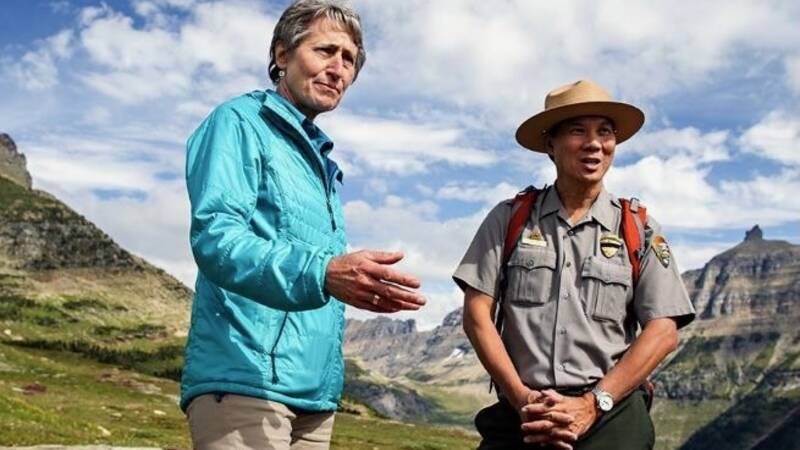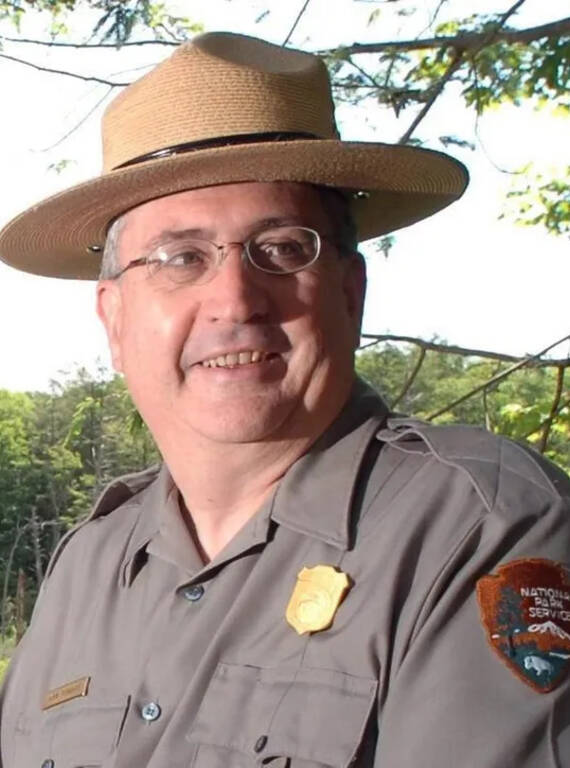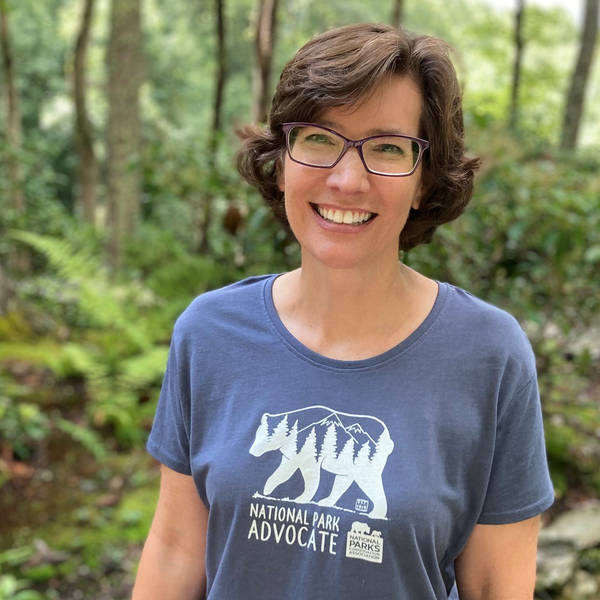After devoting their careers to protecting our country’s natural and cultural treasures, Dan Wenk, Jeff Mow and John Donahue are watching harmful staff cuts and more gut the National Park Service — and for what gain?
The National Park Service makes up less than one-fifteenth of 1 percent of the federal budget but delivers a $15 boost to the nation’s economy for every dollar invested. Parks generate billions of dollars for local economies and create thousands of jobs. Yet the Trump administration is hitting the agency hard as part of its federal government shake-up in the name of efficiency, despite the agency being the face of efficiency for decades.
We asked three career Park Service civil servants for their thoughts on the impact of the administration’s actions.
Jeff Mow, 33 years of service
“As a retiree of the National Park Service, it has been painful to not only watch the callousness and less than competent reorganization, but also how the administration has denigrated the value of public service to this nation in so many ways,” said Jeff Mow, who held a variety of leadership positions within the Park Service, from Alaska to Washington, D.C. “This will have impacts on the workforce for generations to come.”
Mow said his biggest concern for the agency’s future is the “hollowing out” of the National Park Service — the loss of institutional knowledge and understanding that comes with the administration’s drastic cuts to park staffing and potential closures of its regional and program offices and service centers.

Then-Interior Secretary Sally Jewell with Glacier National Park Superintendent Jeff Mow in 2016.
Courtesy of Jeff MowHe’s also concerned about recent proposals to move some units to states based on visitation and popularity, which he described as indicative of “a failure to understand that NPS sites are established for their national significance to the country’s natural and cultural heritage and not their market potential.”
“We are seeing an administration that is not asking questions, not taking the time to understand the National Park Service mission and is not being very thoughtful, but is simply applying brute force business tactics to government agencies,” Mow said. “I’ve done a fair bit of leadership training involving business leaders, and there aren’t many who would say any of this emulates good business practices.”
“We are seeing an administration that is not asking questions, not taking the time to understand the National Park Service mission.”
The administration’s “chaotic” methods, he said, have “left so many of the partners and partner organizations just flabbergasted and wondering what’s this going to mean.”
Mow, who retired in 2021, is a board member for the Coalition to Protect America’s National Parks, National Parks Friends Alliance and Park Service partner organizations. He stays in tune with Tribes and local communities that partner with the Park Service on joint projects, from climate change to landscape conservation issues such as bringing back bison or handling elk migration. With reduced staffing, the parks will struggle to participate in these collaborative efforts as originally planned, he said.
He said there is also concern over the administration’s plan to turn civil servant positions into fireable-at-will positions, also known as Schedule F, and whether that means political appointees could become superintendents of park units. “We just don’t know, and it presents so much uncertainty,” Mow said.
Mow’s career highlights: Superintendent of Glacier National Park, Denali National Park and Preserve, Florissant Fossil Beds National Monument and Kenai Fjords National Park; acting director, Alaska Region; acting deputy director, Intermountain Region in Colorado; and NPS Bevinetto Fellow, 107th Congress.
John Donahue, 38 years of service
“The national parks are our cathedrals and our backyards not to be taken away by ideology or tax cuts for the wealthiest among us,” said John Donahue, who retired in 2017. “These Trump cuts will devastate the NPS in a way that is not recoverable. It may take another century to undo the damage our heritage is suffering.”

Retired Park Superintendent John Donahue.
Courtesy of John DonahueDonahue started his Park Service career as a gardener at Cape Cod National Seashore, not long after the United States celebrated its 1976 bicentennial. He recalled parks having been given extra money to help the country mark its milestone, but that soon after, funding began a continual decline.
“In my experience, the parks I managed were always underfunded,” he said. The Trump administration’s recently released budget proposal that calls for a cut of more than $1 billion to the Park Service, isn’t “cutting fat from an already emaciated agency; this is cutting muscle and bone,” he said.
NPCA has calculated that proposed cuts of this magnitude could shutter at least 350 national parks sites across the country, effectively more than 75% of our Park System.
“Whatever is left will be a shadow of the once greatest park system in the world,” Donahue said.

Cut to the Bone
The Trump administration has threatened to close the National Park Service’s regional offices and cut even more staff in the coming weeks. We examine what that would mean for parks…
See more ›He wonders if the end goal is to “cripple the agencies and then claim they cannot do their job,” which would be “a pretext to privatizing the parks for greater benefit for the wealthy.”
Donahue said regional support offices should be kept because they are so important for efficiently employing the personnel parks need to get various jobs done, expertise that park leadership may not have capacity for. This includes bookkeepers, contract officers, design and construction personnel, engineers, purchasing agents, landscape designers, compliance specialists, human resources specialists and more.
Gutting the National Park System “really doesn’t make any sense when the entire National Park Service probably costs as much as two B2 bombers, and you get so many benefits from it.”
The National Mall, for example, could not have so beautifully and seamlessly accommodated its new memorials in recent decades — such as the Franklin Delano Roosevelt Memorial, Korean War Veterans Memorial and Vietnam Veterans Memorial — without the landscape architecture experts at the Denver Service Center, Donahue said. That facility is now slated for closure by DOGE.
Donahue remembers a reduction in force led during the Clinton administration in 1990s, which took two to three years of thoughtful planning with stakeholders. Such consultation might slow down a process, he said, but it also “slows down the mistakes that would be almost mandatory as a result of just doing everything across the board.”
Gutting the National Park System “really doesn’t make any sense when the entire National Park Service probably costs as much as two B2 bombers, and you get so many benefits from it,” he said.
Donahue’s career highlights: Superintendent of Delaware Water Gap National Recreation Area, Middle Delaware Scenic and Recreational River, Big Cypress National Preserve, DeSoto National Memorial, George Washington Birthplace National Monument and Thomas Stone National Historic Site; environmental specialist in the Park Service’s Washington Office; chief of resource management and visitor services at Cape Cod National Seashore.
Dan Wenk, 43 years of service
Dan Wenk, who retired as superintendent of Yellowstone National Park in 2018, said his crystal ball for national parks is cloudy. The public may recognize how unfortunate staff cuts to national parks may be, he said, but they aren’t aware of the real danger.
“Parks can hide it for a year or more because [superintendents] have been told to keep the parks open, and so they will pull resources from other things in order to meet that mandate. But the long-term impact is apparently nothing to this administration. But it should be a concern to the public,” he said.
“My biggest concern on where all this is going is we’re vastly impacting the cadre of recruits to the National Park Service and the preservation of public lands. I think a generation from now, the reasons people love the national parks are going to be diminished by what has happened to those resources.”
“The long-term impact is apparently nothing to this administration. But it should be a concern to the public.”
Future park advocates are cultivated by the interaction park visitors have with park rangers and the educational programs they offer, he explained. “I care very much that we will not be creating the number of advocates or advocates with the same kind of passion or intensity of passion we’ve created in the past. I think we will have less of them.”
While parks generally have been underfunded for a long time, he said the benefits of having regional offices includes having those staff decide how to effectively distribute funds approved in Congress among the region’s parks based on park needs. If regional offices are closed, leaders in Washington, D.C., are too far away to understand that nuance, he said. He likens park operations to naval ships, which go to regional ports to be refitted and maintained — not to the Pentagon.
Stay On Top of News
Our email newsletter shares the latest on parks.
Wenk began his Park Service career as a landscape architect at the Denver Service Center, where later as director he oversaw an overhaul of the center’s planning, design and construction services to be more efficient. Rather than have DOGE make drastic cuts without knowledge of the agency, he encouraged the administration to allow the Park Service to find its own solutions, as it has in the past.
“If Sec. Burgum had said, ‘We need you to cut X-number of dollars or X percent,’ and let the Park Service figure out how to do it and to do it, I guarantee you you’ll have better results, and you won’t lose some of the incredible experience,” he said.
Wenk’s career highlights: Superintendent of Yellowstone National Park and Mount Rushmore National Memorial; director of the agency’s Denver Service Center.
About the author
-
 Linda Coutant Staff Writer
Linda Coutant Staff WriterAs staff writer on the Communications team, Linda Coutant manages the Park Advocate blog and coordinates the monthly Park Notes e-newsletter distributed to NPCA’s members and supporters. She lives in Western North Carolina.
-
General
-
Issues


